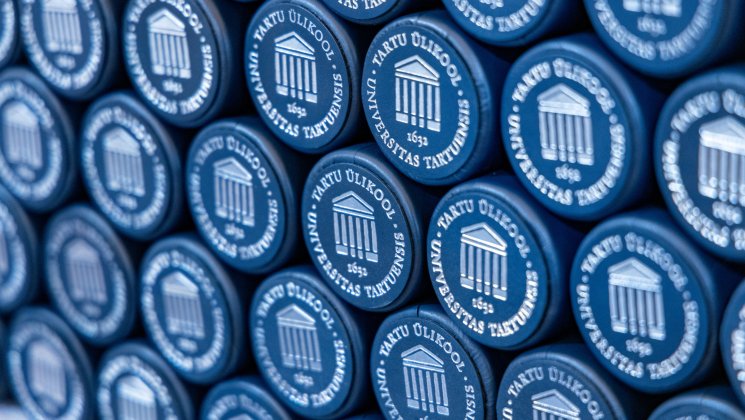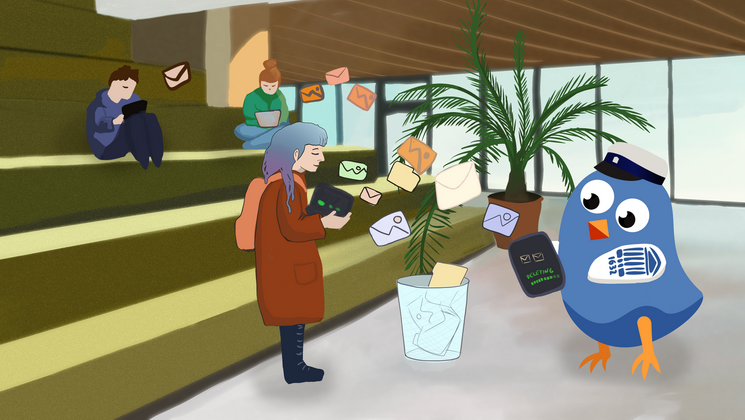-
Faculty of Arts and HumanitiesDean's Office, Faculty of Arts and HumanitiesJakobi 2, r 116-121 51005 Tartu linn, Tartu linn, Tartumaa EST0Institute of History and ArchaeologyJakobi 2 51005 Tartu linn, Tartu linn, Tartumaa EST0Institute of Estonian and General LinguisticsJakobi 2, IV korrus 51005 Tartu linn, Tartu linn, Tartumaa EST0Institute of Philosophy and SemioticsJakobi 2, III korrus, ruumid 302-337 51005 Tartu linn, Tartu linn, Tartumaa EST0Institute of Cultural ResearchÜlikooli 16 51003 Tartu linn, Tartu linn, Tartumaa EST0Institute of Foreign Languages and CulturesLossi 3 51003 Tartu linn, Tartu linn, Tartumaa EST0School of Theology and Religious StudiesÜlikooli 18 50090 Tartu linn, Tartu linn, Tartumaa EST0Viljandi Culture AcademyPosti 1 71004 Viljandi linn, Viljandimaa EST0Professors emeriti, Faculty of Arts and Humanities0Associate Professors emeriti, Faculty of Arts and Humanities0Faculty of Social SciencesDean's Office, Faculty of Social SciencesLossi 36 51003 Tartu linn, Tartu linn, Tartumaa EST0Institute of EducationJakobi 5 51005 Tartu linn, Tartu linn, Tartumaa EST0Johan Skytte Institute of Political StudiesLossi 36, ruum 301 51003 Tartu linn, Tartu linn, Tartumaa EST0School of Economics and Business AdministrationNarva mnt 18 51009 Tartu linn, Tartu linn, Tartumaa EST0Institute of PsychologyNäituse 2 50409 Tartu linn, Tartu linn, Tartumaa EST0School of LawNäituse 20 - 324 50409 Tartu linn, Tartu linn, Tartumaa EST0Institute of Social StudiesLossi 36 51003 Tartu linn, Tartu linn, Tartumaa EST0Narva CollegeRaekoja plats 2 20307 Narva linn, Ida-Virumaa EST0Pärnu CollegeRingi 35 80012 Pärnu linn, Pärnu linn, Pärnumaa EST0Professors emeriti, Faculty of Social Sciences0Associate Professors emeriti, Faculty of Social Sciences0Faculty of MedicineDean's Office, Faculty of MedicineRavila 19 50411 Tartu linn, Tartu linn, Tartumaa ESTInstitute of Biomedicine and Translational MedicineBiomeedikum, Ravila 19 50411 Tartu linn, Tartu linn, Tartumaa ESTInstitute of PharmacyNooruse 1 50411 Tartu linn, Tartu linn, Tartumaa ESTInstitute of DentistryL. Puusepa 1a 50406 Tartu linn, Tartu linn, Tartumaa ESTInstitute of Clinical MedicineL. Puusepa 8 50406 Tartu linn, Tartu linn, Tartumaa ESTInstitute of Family Medicine and Public HealthRavila 19 50411 Tartu linn, Tartu linn, Tartumaa ESTInstitute of Sport Sciences and PhysiotherapyUjula 4 51008 Tartu linn, Tartu linn, Tartumaa ESTProfessors emeriti, Faculty of Medicine0Associate Professors emeriti, Faculty of Medicine0Faculty of Science and TechnologyDean's Office, Faculty of Science and TechnologyVanemuise 46 - 208 51003 Tartu linn, Tartu linn, Tartumaa ESTInstitute of Computer ScienceNarva mnt 18 51009 Tartu linn, Tartu linn, Tartumaa ESTInstitute of GenomicsRiia 23b/2 51010 Tartu linn, Tartu linn, Tartumaa ESTEstonian Marine Institute0Institute of PhysicsInstitute of ChemistryRavila 14a 50411 Tartu linn, Tartu linn, Tartumaa EST0Institute of Mathematics and StatisticsNarva mnt 18 51009 Tartu linn, Tartu linn, Tartumaa EST0Institute of Molecular and Cell BiologyRiia 23, 23b - 134 51010 Tartu linn, Tartu linn, Tartumaa ESTTartu ObservatoryObservatooriumi 1 61602 Tõravere alevik, Nõo vald, Tartumaa EST0Institute of TechnologyNooruse 1 50411 Tartu linn, Tartu linn, Tartumaa ESTInstitute of Ecology and Earth SciencesJ. Liivi tn 2 50409 Tartu linn, Tartu linn, Tartumaa ESTProfessors emeriti, Faculty of Science and Technology0Associate Professors emeriti, Faculty of Science and Technology0Institute of BioengineeringArea of Academic SecretaryHuman Resources OfficeUppsala 6, Lossi 36 51003 Tartu linn, Tartu linn, Tartumaa EST0Area of Head of FinanceFinance Office0Area of Director of AdministrationInformation Technology Office0Administrative OfficeÜlikooli 17 (III korrus) 51005 Tartu linn, Tartu linn, Tartumaa EST0Estates Office0Marketing and Communication OfficeÜlikooli 18, ruumid 102, 104, 209, 210 50090 Tartu linn, Tartu linn, Tartumaa EST0Area of RectorRector's Strategy OfficeInternal Audit OfficeArea of Vice Rector for Academic AffairsOffice of Academic AffairsUniversity of Tartu Youth AcademyUppsala 10 51003 Tartu linn, Tartu linn, Tartumaa EST0Student Union OfficeÜlikooli 18b 51005 Tartu linn, Tartu linn, Tartumaa EST0Centre for Learning and TeachingArea of Vice Rector for ResearchUniversity of Tartu LibraryW. Struve 1 50091 Tartu linn, Tartu linn, Tartumaa EST0Grant OfficeArea of Vice Rector for DevelopmentCentre for Entrepreneurship and InnovationNarva mnt 18 51009 Tartu linn, Tartu linn, Tartumaa EST0University of Tartu Natural History Museum and Botanical GardenVanemuise 46 51003 Tartu linn, Tartu linn, Tartumaa EST0International Cooperation and Protocol Office0University of Tartu MuseumLossi 25 51003 Tartu linn, Tartu linn, Tartumaa EST0
Geoinformatics community gathers in Tartu to discuss wider use of free and open-source software
The international geoinformatics conference “Free and Open Source for Geospatial (FOSS4G) Europe 2024” will take place in Tartu, Estonia, from 1 to 7 July, focusing on the application and development potential of free and open source geoinformatics applications enabling both everyday services and cutting-edge research. The 160 presentations of the conference are livestreamed for all interested.
Free and open-source geoinformatics software (FOSS4G) allows the creation of applications for mapping one’s personal berry and mushroom patches, as well as building large-scale global climate models. Such applications are used by large international companies (such as Google, Uber, and Amazon) and public authorities and companies in Estonia (e.g. Land Board, Agricultural Registers and Information Board (PRIA), State Forest Management Centre (RMK)) and elsewhere in the world.
According to Tõnis Kärdi, a member of the conference organising committee, the great value of free and open-source geoinformatics software is that it is cost-effective and inclusive, fostering cooperation between countries and between spheres of life. “This way, geoinformatics tools are available in every corner of the world, not only to the big players but also to individuals, educational institutions, municipalities and small and startup businesses,” said Kärdi. Besides that, he believes that the most significant asset is the people who hold the whole system together. “We are an open community who shares our knowledge and experience worldwide,” he said.
Thanks to the collaboration of a global community of developers, this kind of software evolves faster than many business software programs. According to Evelyn Uuemaa, Professor of Geoinformatics at the University of Tartu, Estonia has seen a surge of interest in FOSS4G applications over the past decade. Unfortunately, the community of developers of this type of software is still relatively small here. “The University of Tartu is the only higher education institution in Estonia where it is possible to earn a master’s degree in geoinformatics, and open-source software plays an important role in these studies. Currently, employers’ demand for specialists in this field is so high that most of our students already work in their chosen specialisation before graduation,” said Uuemaa.
The versatility of FOSS4G is also reflected in the wide range of topics presented by the keynote speakers at the Tartu conference. Stefanie Lumnitz from the European Space Agency (ESA) will talk about applications for planetary exploration, while Athina Trakas, an innovation expert from the European Centre for Medium-Range Weather Forecasts (ECMWF), will explain how the software has influenced the field of meteorology and climate science. Geoinformatics specialist and Product Manager at the transport and logistics company Trimble Transportation, Jaak Laineste, will discuss how FOSS4G can help reduce the carbon footprint in the transport sector.
The Free and Open Source for Geospatial (FOSS4G) Europe 2024 conference brings together almost 450 participants from around the world to Tartu. It is organised in cooperation with the international Open Source Geospatial Foundation (OSGeo), the University of Tartu’s Landscape Geoinformatics working group, and the Estonian Geoinformatics Society.
The conference is supported by GEOCAT BV, rapidlasso GmbH, OPENGIS.ch and the European Commission’s Destination Earth initiative. The participants’ moving around in the city is supported by the Tartu City Government.

Doctoral defence: Antonina Martynenko „Традиции и инновации в русской поэзии второй половины 1830-х гг.: количественное исследование“


